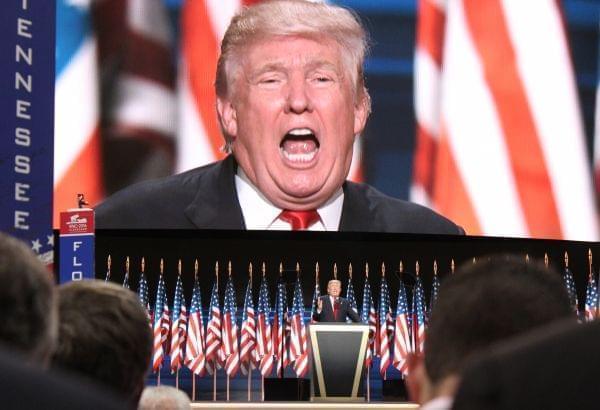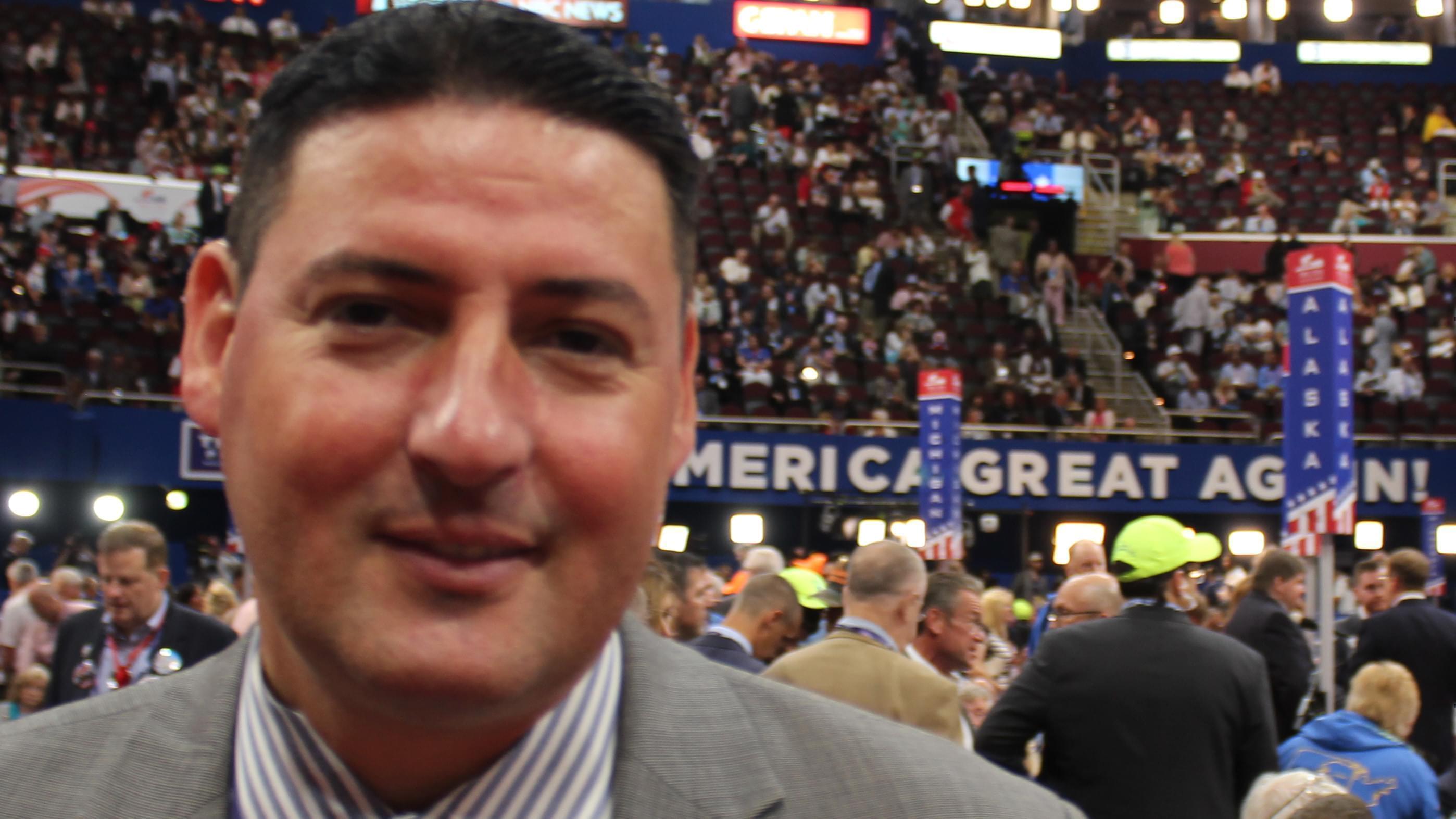Convention Provides Look At GOP’s Diversity Score

GOP presidential nominee Donald Trump delivers his acceptance speech at the Republican National Convention in Cleveland Thursday night. Amanda Vinicky / WUIS
Illinois delegates to this year’s Republican National Convention in Cleveland provided an opportunity for a GOP diversity check.
The need for more minority outreach is something Republicans have been talking about your years.
Illinois leaders like former Governor Jim Edgar said at the 2008 Republican National Convention that it should be a goal. And the Republican National Committee autopsy of the 2012 election recommended a dedicated campaign for black, Hispanics and Asian voters.
If you took a snapshot of the Illinois delegation to the Republican National Convention --- the 69 actual delegates, plus alternates, their guests, a smattering of elected officials -- you wouldn’t be able to tell at a glance who’s a die-hard Trump supporter or who is still struggling to accept the reality that a reality TV star is the party’s nominee for president.
What would be obvious is this: nearly every single delegate is white. With just a few exceptions. Like State Rep. John Cabello of Rockford.

State Rep. John Cabello (R-Rockford)
As co-chair of Trump’s Illinois campaign, he got to give an introduction Tuesday night, during the roll call of states that culminated in Trump’s official nomination.
And introducing himself, Cabello notes that he was “only Hispanic member on the Republican side of the aisle serving the House of Representatives.”
Cabello says while he’d love more minorities in the GOP it’s tough to find many willing to run as a Republican, mostly because the would-be recruits believe they’ll have such a hard time winning.
Cabello’s theory is that Chicago has a much larger population of ethnic people (and in fact, more legislators of color do hail from the city); and Democrats have drawn the city’s districts in a way that gives them the advantage.
“Anybody that thinks there are no minorities that are Republicans, I’ll say it, is insane,” said Cabello. “Anybody that says that Republicans don’t want any Latinos or minorities in the party, is insane. Exclamation point. If you think that, you’re an idiot.”
It’s just that you’d never know that by glancing at Illinois’ delegation to the RNC, or, for that matter, by looking at a roster of Republican serving Illinois in congress or the state legislature.
And just the other day, the Illinois Republican Party’s executive committee revoked the credentials of a Trump delegate who posted a racist message on Facebook threatening violence.
In a statement, party chairman Tim Schneider condemned her comments, and said “racism and threats of violence have absolutely no place in the Illinois Republican Party or in a civil and inclusive society.”
Many of the Trump delegates to the RNC are brand new to the process; they were sought out by the man who formally managed Trump’s operations in Illinois.
So, in one sense, Trump’s campaign may have helped expand the Republican tent.
Just not necessarily in the way that that 2012 report had outlined.
And yet --- critics say the party’s new presidential nominee could be a turn-off to certain ethnic groups--- be it because of his plan to build a massive wall on the border with Mexico, or his call to ban Muslims from entering the country. They say those proposals also raise questions of how inclusive Donald Trump’s policies would be if elected.
Illinois Congressman Adam Kinzinger says it remains to be seen what effect those ideas will have on the election.
“There’s no doubt that people that have voted Democratic, the blue-collar Democratic voters, are finding his message attractive, “said Kinzinger, who has been reluctant to give Trump his own whole-hearted endorsement. “So you can pull those folks in. But in terms of the minority vote, we’ll see. He thinks he’s doing well among them. I think Election Day, we’ll find out whether or not that’s the case.
But a recent Wall Street Journal poll was pretty definitive for political strategist David Axelrod:
“I saw he was getting 14 percent of the Hispanic vote,” said Axelrod, who worked for Barack Obama’s two presidential campaigns as well as in his administration. “That’s half of what Mitt Romney got that caused all of the alarm in the Republican Party. In some polls he’s getting zero percent of the African American vote. So, you know, in a country that’s becoming more diverse all the time this has to be a troubling set of numbers for the Republicans.”
For delegate Aaron Del Mar of the Chicago suburb of Palatine, immigration is a cornerstone – and selling point – of Trump’s platform. He says his dad and aunts immigrated to the U.S., and played by the rules.
“There are no free rides,” said Del Mar. “My dad would stand with that, my family. A lot of people who came legally are on our side. Why should everyone else get to cut in line and get to bypass when they’ve had to work and earn their way over?”
But Del Mar says the portrayal of the Republican Party as made of “staunch, white bankers, you know, in the three piece suit” isn’t accurate. He gives himself as an example.
”You don’t get any more diverse than a Filipino/French-Canadian, you know?” said Del Mar.
DelMar has had success moving up. Until he decided not to run again earlier this year, he was chair of the Cook County GOP.
But at the same time, he says the party needs to do more work. He says there isn’t any active recruiting of Muslims, Jews, blacks, or Latinos.
“So I think that’s the next step the party needs to go,” said Del Mar. “Yes, we’ll be accepting of everybody. But we need to actively pursue and bring those people on our side. That has been historically a stronghold of the Democrats. So a lot of people figure that you know, there’s no way we’ll be able to pull those guys to our party. But I think that’s a loser mentality. I think that if we actively go after those specific groups and develop those relationships, that we’ll be way more successful and we’ll garner more votes.”
After all --- winning elections is what it’s all about.
And right now, Del Mar says, Illinois Republicans have a hard time doing that.

